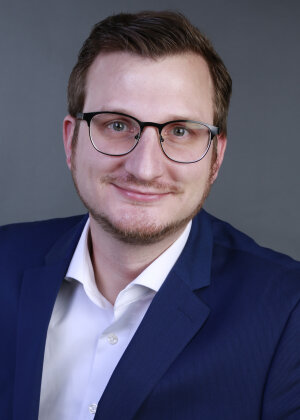
The Institute of Geography has a new junior professorship - it is held by Dr. Andreas Rienow, a long-time member of the AG Geomatik.
Since junior professorships in geography are still relatively unknown in Bochum, we asked him for some information not only about his career, but also about his professorship.
Where do you come from, Prof. Rienow?
I spent my youth in the Lower Rhine region: Born in Moers, grew up in Neukirchen-Vluyn. The years of teaching and travelling brought me to Bonn, where I completed my master's degree in geography, modern German literature and modern history. There I also did my doctorate on modelling urban sprawl with AI under Prof. Dr. Gunter Menz (†2016). The master's years then took me back (yes, Neukirchen-Vluyn is part of it) to the Ruhr area, to beautiful Bochum. With Prof. Jürgens, I had the opportunity to take the projects that I had already partly led in Bonn to a new level at the RUB. In ESERO Germany we talk on the phone with astronauts, discuss with Harald Lesch, fly virtually to the moon and Mars and, of course, take a close look at the Earth from the ISS and satellites. So with ESERO we want to get young people excited about STEM topics and sustainability issues. Paxi, our mascot, is always with us. How does that fit in with my future work here? From 1 January 2020, I will be a junior professor for interdisciplinary geoinformation science. The major research topics for me are the spatio-temporal analysis of the transformation of metropolitan spaces, the interdisciplinary integration of geodata and the analysis of (real-time) geoinformation and crowd mapping. The last two blocks in particular form the bridge between my current projects on earth observation and climate adaptation and my future focus I am very happy that I can continue working at the GI as a junior professor with this great environment. Many young scientists here are really keen to do innovative research and, at the same time, make the world a little better place.
Where do you want to go (with us as GI)?
To the top, where else. We are working with a GI working group, the "Transformers", to develop a long-term strategy for the Institute. With this strategy, we want to align research within the thematic complex "Transformation of Metropolitan Regions" along the crystallisation cores Green, Resilient, and Smart Cities. Excellence in research and teaching is our goal, and we always keep our eye on the "pulse of time". Never has the time been so right and important to study geography as now, to deal with the implications of coupled human-environment systems in times of global change and to counter fake news with hard facts.
What is a junior professorship? What distinguishes it from other professorships?
As a W1 junior professor, I am a temporary civil servant and have to be evaluated after three years. Here, a commission looks at what success I have been able to achieve for the institute in research, teaching, self-administration and networking. After that, I have another three years before I receive the tenure track to a W2 lifetime professorship if the evaluation is positive. A really great perspective.